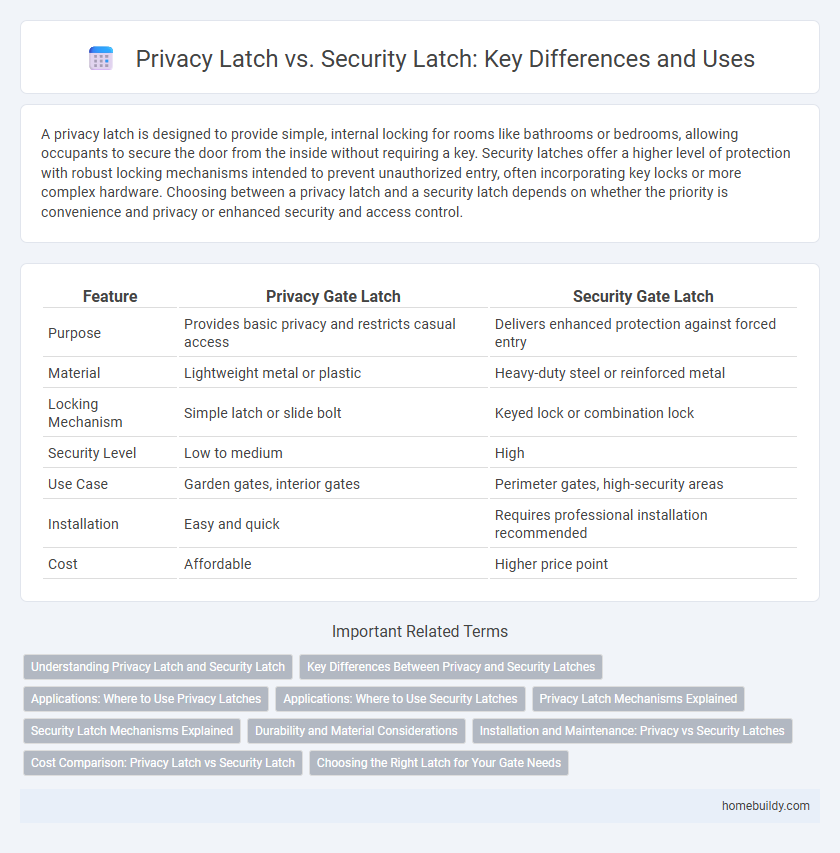A privacy latch is designed to provide simple, internal locking for rooms like bathrooms or bedrooms, allowing occupants to secure the door from the inside without requiring a key. Security latches offer a higher level of protection with robust locking mechanisms intended to prevent unauthorized entry, often incorporating key locks or more complex hardware. Choosing between a privacy latch and a security latch depends on whether the priority is convenience and privacy or enhanced security and access control.
Table of Comparison
| Feature | Privacy Gate Latch | Security Gate Latch |
|---|---|---|
| Purpose | Provides basic privacy and restricts casual access | Delivers enhanced protection against forced entry |
| Material | Lightweight metal or plastic | Heavy-duty steel or reinforced metal |
| Locking Mechanism | Simple latch or slide bolt | Keyed lock or combination lock |
| Security Level | Low to medium | High |
| Use Case | Garden gates, interior gates | Perimeter gates, high-security areas |
| Installation | Easy and quick | Requires professional installation recommended |
| Cost | Affordable | Higher price point |
Understanding Privacy Latch and Security Latch
Privacy latch and security latch serve distinct purposes in gate hardware, with privacy latches designed primarily to prevent accidental opening while maintaining easy access, and security latches engineered to offer robust resistance against forced entry. Privacy latches typically use simple locking mechanisms such as thumb turns or push buttons, suitable for residential gates where convenience is prioritized over high security. Security latches incorporate heavy-duty materials and tamper-resistant designs, often featuring keyed locks or combination systems to safeguard restricted areas effectively.
Key Differences Between Privacy and Security Latches
Privacy latches primarily restrict access to maintain personal space without heavy-duty security features, often used on interior doors or privacy gates. Security latches are designed with robust materials and locking mechanisms to prevent unauthorized entry, ideal for exterior gates or high-risk areas. The key differences lie in their intended use, with privacy latches offering convenience and privacy, while security latches focus on durability and protection.
Applications: Where to Use Privacy Latches
Privacy latches are ideal for residential gates, garden fences, and interior doors where controlled access and simple privacy are essential. These latches provide easy locking to prevent casual entry while allowing quick exit, making them suitable for bedrooms, bathrooms, and locked garden areas. Unlike security latches, privacy latches do not offer high-security features, so they are best used in low-risk locations requiring temporary or moderate privacy.
Applications: Where to Use Security Latches
Security latches are designed for high-risk environments such as commercial properties, industrial sites, and exterior gates requiring enhanced protection against unauthorized access. They offer stronger materials and locking mechanisms compared to privacy latches, making them suitable for perimeter gates, warehouses, and secured utility areas. Security latches ensure robust defense in applications demanding durability and resistance to tampering.
Privacy Latch Mechanisms Explained
Privacy latch mechanisms are designed primarily to restrict access while maintaining user convenience, typically featuring simple locking systems that prevent casual entry without heavy-duty security measures. These latches use internal locking components like thumb-turns or push-button locks to offer privacy within confined spaces, ideal for residential or interior gate applications. Unlike security latches, which emphasize resistance to forced entry and may include reinforced materials or key-operated locks, privacy latches focus on ease of use and quick locking functionality.
Security Latch Mechanisms Explained
Security latch mechanisms provide enhanced protection by incorporating robust locking systems that resist forced entry and tampering, making them ideal for gates requiring high security. These latches often feature heavy-duty materials such as steel or reinforced alloys, combined with secure locking components like deadbolts or padlocks. In contrast to privacy latches, security latches focus on preventing unauthorized access rather than merely restricting visibility or casual use.
Durability and Material Considerations
Privacy latches are typically made from lightweight materials such as aluminum or plastic, prioritizing aesthetic appeal and ease of use, but they may lack the durability required for high-security applications. Security latches utilize robust materials like stainless steel or reinforced brass, offering enhanced resistance to physical tampering and weather conditions, ensuring long-term durability. Choosing the appropriate gate latch depends on balancing the need for privacy against the level of security and material strength required for the gate's intended purpose.
Installation and Maintenance: Privacy vs Security Latches
Privacy latches typically require simpler installation processes, often designed for ease of use on interior gates or doors where quick locking is prioritized. Security latches demand more robust installation techniques, involving reinforced mounting hardware and alignment checks to withstand forced entry attempts. Maintenance for privacy latches involves basic lubrication and occasional adjustment, whereas security latches require regular inspections to ensure structural integrity and proper function under high-stress conditions.
Cost Comparison: Privacy Latch vs Security Latch
Privacy latches typically cost less than security latches due to simpler locking mechanisms and fewer reinforced materials. Security latches incorporate advanced features such as tougher metals and tamper-resistant designs, resulting in higher manufacturing and retail prices. Choosing between the two depends on budget constraints and the level of protection required for the gate.
Choosing the Right Latch for Your Gate Needs
Privacy latches prioritize concealment and ease of use, often featuring simple locking mechanisms ideal for residential gates to maintain personal privacy. Security latches emphasize robust construction and tamper-resistant features such as keyed locks or heavy-duty materials to prevent unauthorized access. Selecting the right latch depends on whether your priority is discreet privacy or enhanced protection against intruders.
privacy latch vs security latch Infographic

 homebuildy.com
homebuildy.com